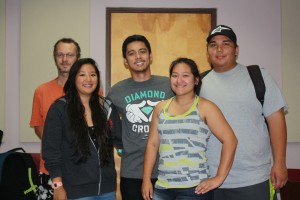
Some Mod 6, CanSat team and their adviser. From Left: Dr. Herve Collin, Diamond Tachera, McClyde Gaborno, Rae-zan Raposas and Logan Tamayo.
Kapi’olani Community College won international acclaim in June by taking first place in the annual Cannister Satellite (CanSat) competition in Abilene, Texas. The winning team, Mod 6, is made up of seven KapCC students, Diamond Tachera, Kelsey Kawaguchi, Rae-zan Raposas, brothers Joshua Tamayo and Logan Tamayo, McClyde Gaborno, and Taylor Viti.
All seven of the science, technology, engineering, and math (STEM) students started in the KapCC summer bridge program.
The Summer Bridge program at KapCC is a six-week intensive program to help college freshmen bridge the gap between high school and college. The program has recently begun accepting students entering their second and third year as well as recent high school graduates. Not only does the free summer bridge program offer classes to help students upgrade their math skills, it offers free lunch everyday and major perks for the coming school year with a free laptop, free textbooks and a custom made electric guitar that the students build themselves. Students only need to apply and be accepted into the free program to get all of these great tools for success- for free.
Students who participate in the summer bridge program are eligible to compete in the annual, International CanSat competition, which is also free. This year, the student’s entry and participation in the competition were paid for by grants from the National Science Foundation, the Pre-engineering Education Collaborative grant and the Tribal Colleges and Universities Program grant.
The CanSat website describes the competition as “an annual student design-build-launch competition for space-related topics.”
The website states that CanSat is different from other competitions of it’s kind because, “most space-related competitions are paper design competitions. While these are worthwhile, they do not give students the satisfaction of being involved with the end-to-end lifecycle of a complex engineering project, from conceptual design, through integration and test, actual operation of the system and concluding with a post-mission summary and debrief.”
In short, CanSat is a very elaborate “egg drop” competition. Many elementary and middle school science classes perform elementary level “egg drops” in which students create a parachute or padding for an egg and then drop it off of a roof. Students who get chosen to participate in CanSat are responsible for creating a workable, launchable, spaceship, that is a very elaborate version of an “egg drop.”
Each member of the team worked on a part of the project such as egg protection (padding and the parachute), the deploying mechanism for the parachute, creating a stopping mechanism, ground control, software construction and programming, and building the presentation.
“Communication was essential for this particular project because everything depended on working together,” said Gaborno. “If one person’s part didn’t work, the entire project didn’t work.”
Mod 6 not only has something spectacular to add to their resumes and transcripts from winning this prestigious award but they have the experience and validation to know that a career in a STEM field is not only within reach but fun. Taehera said that the experience has made her more certain about her career path.
“It made me realize this is what I want to do,” Raposas said.
Winning not only proved to the team that they were viable competitors in a world wide contest, but that careers in STEM fields is what they want to pursue.
“It’s kind of like a real life experience where not only are you in this competition where you have to build something, but they expect you to do two really big presentations,” Logan Tomayo said.
For Mod 6, the CanSat was their first undergraduate competition.
When asked about winning the competition, Gaborno said, “We were shocked. When looking at the other competing teams at CanSat and how they operated, they were top notch. We were particularly thinking that the team from Iran was going to win.”
The team was disappointed, but only momentarily.
“When we heard that they (Iran) were second place, I was like, we didn’t even place,” Gaborno said. “And then they announced our name and I was like, what? It was unreal.”
Mod 6 got a chance to use the networking skills they learned in the summer bridge program when meeting with teams from all over the world.
“The Sunday after the competition and when they announced the awards, we hung out with teams from Guatemala, Minnesota, India, and LCC (Leeward Community College),” Logan Tomayo said.
LCC placed in the top 10 and it was their first year involved. This year was KCC’s fifth year attending the competition.
“Our experiences through STEM helped mold us and prepare us for the teamwork and communication (this competition required),” Gaborno said. “You get to network and communicate (in the summer bridge program).”
